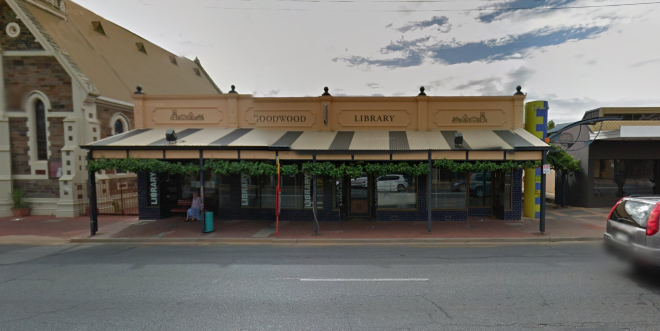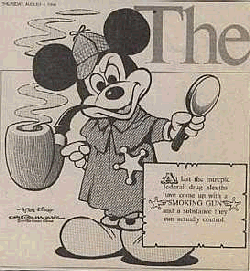
Hey yo,
So I’m visiting my old home town in Adelaide (and yes, I will be visiting the old library while I’m here), and I’ve been sitting in old bars and cafes I used to frequent, and walking down old streets I’ve not trod for decades, and I’m feeling reflective.
But nice as it’s been to think back on old years and reconnect a bit with my past, it’s given me fresh pause to think about the here and now, and – of course – to think about the year, on this its last day. And since, dammit, this blog is my fucking soapbox, I’m going to do it right here.
I almost hesitate to call 2014 a year of change for me, because 2013 was so much more so; but if anything, change keeps happening for me. I’m not the person I was twelve months ago, and my life, while cosmetically similar, isn’t the same life. Let’s call it ‘continuous change’ and just say I’m living in interesting times.
There have been loads of highs, especially for me (and, of course, Abaddon), and a few lows, largely for the world in general. There’s been a lot to rejoice in, and a lot to learn from. So, since this is the internet, let’s do this list-style:
My Job
I hit five years in the industry and with Rebellion late this year, and it’s been a ride. More than anything, I’m grateful that part of my job is being able to say “yes” to writers. I’ve been running Abaddon for a little over a year as well, and this was the year that many of my babies – the commissions that were wholly my call, from conception to contract – hit the shelves. It’s been incredible seeing Sarah’s Uprising, and Adrian, Malcolm and Colin’s Journal of the Plague Year, and Two Hundred and Twenty-One Baker Streets, among others, turn up in the flesh (as it were), and I’m proud of what we’ve done.

Pictured: The moment a little bit of wee came out.
To say nothing of the social whirlwind that is publishing, flying to World Fantasy Con and gettin’ down at LonCon and FantasyCon and the like. It’s always a blast spending time with the brilliant, bizarre people of the genre world.

Pictured: Work.
My Writers
Which brings me to the people who write for me. Between approaching people I already knew, giving the nod to submissions and simply trawling for talent at conventions, commissioning puts you in touch with an exraordinary mix of people. I’ve met, worked with and now Facebook-stalk some brilliant men and women this past twelve months, and my life is richer for them.

Pictured: An argument for better security at mental health institutions.
My Writing!
And of course, if you didn’t already know it, I’m a writer myself, with a handful of short fiction credits to my name, and this was the year I was selected for my first Year’s Best anthology, for my mummy-romance short, “Old Souls,” from Jurassic’s Book of the Dead (which you should totes read). The Year’s Best Australian Fantasy and Horror 2013, edited by Liz Grzyb and Talie Helene, is out now.

Pictured: The moment a bit more wee than I should admit to came out.
Spaaaace!
It’s been a big year for space, it seems, between the ESA landing a probe on a comet half a billion kilometres away, India launching their space programme with a 100% successful remote mission, and the first stages of a seemingly solid commitment by NASA to land a human being on Mars already underway.

Pictured: Spaaaaaaaaaaaaace.
I’m… not going to go into the shirt. Suffice it to say I was one of those who felt it was out of line, but that complaint was delivered, it was acknolwedged, and amends were made in a few hours, and the only people still going on about it even a day later were GamerGaters trying to be relevant.
GamerGate
…which brings us to one of the real downers of the year. If you don’t already know who and what GamerGate are, you’re genuinely better off at this point not knowing, and at any rate a lot of people have done it better than I probably would already, so Google it if you’d like. The tl;dr is it’s not been a proud time to be white, male, middle-class, a nerd, a fan of games or on the internet the past few months.

Pictured: An ethic.
It has had its plus points, including this Tumblr feed and the entry onto the world stage of such brilliant, inspirational women as Anita Sarkeesian, Zoe Quinn and Brianna Wu, but the best thing it’s achieved so far is gradually dying away (although it seems it’s not quite dead yet).
Ferguson
While I’m on a down note… Look, I’m not American and I’m not in America, so I appreciate this is an outside perspective and I don’t fully understand the situation, but…
Honestly? It’s really easy not to kill unarmed people. I do it all day. I could come round and show you how. In the meantime, while I’m sure there’s context and it’s all very complex, it just seems like something could be happening differently, and like the people with the ability to make that happen aren’t really listening to the people asking for it. A lot of people are hurting, and a lot of people are angry, and the people with more power and more culpability are shouting at everyone else about how not enough people are empathising with them, and not trying real hard to empathise with anyone else. Not sure what the deal is, but I’m praying for you guys to sort yourselves out.
Marriage Rights
Alright, screw that negative shit. Honestly, if you told me five years ago that David fucking Cameron was going to usher in equal marriage rights in the UK, I’d have called you a goddamned liar to your face, and it turns out I’d have been a fool to do so. Already I have several friends who have jumped on the privilege, and I’m so happy to be living in a time when they can make that choice. Not least because, if this can change, what else can we do in our lifetimes?
Progress
Because… okay, yeah, I’m a big old feminist, in a time when that word is so contentious Time magazine apparently thought it was cool to call for it to be expunged from the English language, and I’m sometimes called a “Facebook feminist” or a “social justice warrior” (which to be honest sounds a lot more badass than the people saying this probably mean it to). But I’ve seen a hundred tiny steps forward this year, not least two people (that I can bring to mind) telling me directly that they’ve changed their outlook on gender in part because I’d helped them understand the world in a different way. It feels like the progressive side is under a huge attack, from the homophobes and the misogynists and the transphobes and the racists and those who demonise the poor – and all the rest – but I honestly believe that’s just because we got them scared.

Pictured: A feminist cookie, just for you.
So keep up the good fight, guys. You’re not the heroes they deserve etc.
This
A thousand, thousand times this.

Pictured: The whole future.
This little creature right here is the most amazing thing in the world. A year ago she couldn’t crawl; now she runs, climbs, sprints and speaks. She teaches me so much about her, and about myself, every day, that I can barely keep up. And she terrifies me; because I want to give her the world she deserves.
Have a fun evening, and a very happy New Year. Here’s to 2015 being even more amazing.
David









